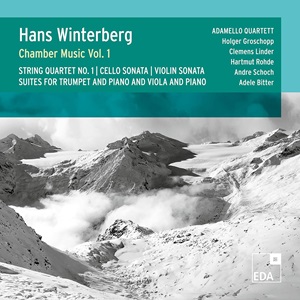
Hans Winterberg (1901-1991)
Chamber Music, Volume 1
Cello Sonata (1951)
Viola Suite (1948-49)
Trumpet Suite No 1 (1945)
Violin Sonata (1936)
String Quartet No 1 (1936)
Hartmut Rohde (viola), Andre Schoch (trumpet), Holger Groschopp (piano)
Adamello Quartet
rec. 2023-24, Emil-Berliner-Studios, Berlin
EDA 051 [67]
Sporadic recordings of the music of Hans Winterberg indicate a more stable approach to his legacy after the successful rescinding of the ban on the performance of his music. This had been imposed by Winterberg’s adopted son Christoph, and fought against by his grandson, Peter Kreitmeir. It’s largely thanks to the last named that we can now hear the music of this Czech-born composer.
All the works in EDA’s disc are heard in first ever recordings, with the exception of the Cello Sonata, which is contained in volume 1 of Toccata’s chamber music series. The same label has also issued a first volume in the piano music series. The Sonata of 1951, as I wrote in my Toccata review, ‘is strongly argued, even aggressive in places but expressive too. To some there may well be echoes of Hindemith. There’s an especially touching theme in the slow movement to offset some of the more outré devices; the finale, meanwhile, is the most extrovert of the three movements, with gleeful hyperkinetic syncopation, jazzy phraseology and – a Winterberg trait – rather obsessive elements.’ Is that a brief embedded quotation of ‘Singing in the Rain’, composed in 1929, or am I hearing things?
That might seem unlikely as Winterberg was a rather wintry kind of composer and EDA runs the programme in reverse chronology, so one can get to grips with him in 1951 and then trace back to 1936. The Viola Suite is a briefer work at only seven minutes, but it’s the most impressionistic of the pieces here, its central movement having colour and nuance, decisively punctuated piano statements marking out its finale. An even briefer work is the Trumpet Suite which is over in under six minutes – all bright, brisk and with one of Winterberg’s trademark natty finales, all capering self-confidence.
The Violin Sonata of 1936 is a larger-scaled work than these examples of Winterberg’s efficient Hausmusik, with a first movement longer in duration than the other two combined. This begins with impressionistic piano figures before Winterberg unleashes tarter, rhythmic writing that’s somewhat clotted in places, sparer in others. The Passacaglia second movement is soon diverted to more aggressive writing and the finale sees an alternation of the brittle with the lyric. It’s not always particularly agreeable, but it is inevitably alive and has a Bartókian fervour to it.
The earliest work is the String Quartet, also dating from 1936. It’s also the longest and, like everything else in this selection, cast in three movements. It wasn’t available for the Amernet Quartet when they recorded the then-extant cycle of quartets (Nos 2 to 4) for Toccata, so it’s valuable to find it here played by the Adamello Quartet. Its unsettled elements are notable, its melancholy too, but coursing through it is a vehemence that borders on the obsessive, notably in the opening movement. The central Molto tranquillo movement sways ambiguously, becoming incrementally lyric but also intense. Tick-tocking opens a finale that jumps into life, as so many of Winterberg’s finales do, with a folkloric rapidity of movement, some of it seemingly Janáček-derived, that’s the clearest sign of his Czech heritage. This unconventional, somewhat cussed writing, rapid in its changes of direction, illustrates his unorthodox inheritance which was later to dissipate during his many years in Germany, opposed as he was to the Communist government in Prague.
The notes are very good, but the recording is, perhaps appropriately, rather blunt and without much warmth. That’s not necessarily true of Winterberg himself, though he remains a plain-speaking, sometimes terse figure amongst composers of his time.
Jonathan Woolf
Buying this recording via a link below generates revenue for MWI and helps us keep free access to the site



















